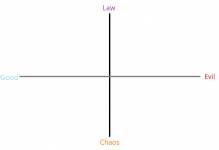"At extremes good loses sight"
No.
At extremes, good is still good. If you make good into evil "At Extremes" you're just doing Horseshoe theory, which essentially ascribes the worst aspects of Law or Chaos to the "Extremes" of good in order to frame good as a bad thing.

Good is all the way on the left, Evil is all the way on the right. "Extreme Good" runs the gamut from Lawful Good (Which is what most people ascribe as the 'Evil' form of Good with rules and demands on everyone) down to Chaotic Good. Think of it as a single pixel width column right on the left end of the bar running from the top corner of the image to the bottom corner of the image. ALL OF THAT is extreme good, running the gamut from Lawful's extreme to Chaos' extreme.
But pure Good, Neutral Good, right on the line between law and chaos, at the extreme left... Doesn't loop around and become evil. Neither does Lawful Good or Chaotic Good, if we wanna be sticklers about it, though the extremes of Law and Chaos cause their own problems.
But there is no wraparound effect where Good becomes Evil.
The whole "Enabling" thing you applied to love? Is not a question of too much love. Someone who loves someone else can take care of them, or let them choose their own path, or create a hybrid between the two based on their own experiences and understanding.
But I'd like to point out, that's a matter of Law and Chaos. Imposing "What's best for them" despite their wishes is on the Law side. Letting them choose to do drugs or whatever is on the Chaos side of allowing them the freedom to make their own choices. Neither of those things is "Love". It's a structure of authority over their autonomy to 'protect' or 'free' them. Both assume you have the right to control another person's autonomy, but one chooses not to exercise that control.
The love remains the same, in either case. And it's not "Loving them too much" to enable them or try to impose limits. That's a whole other separate decision making process that uses Love as the motivation to make a decision.
No.
At extremes, good is still good. If you make good into evil "At Extremes" you're just doing Horseshoe theory, which essentially ascribes the worst aspects of Law or Chaos to the "Extremes" of good in order to frame good as a bad thing.

Good is all the way on the left, Evil is all the way on the right. "Extreme Good" runs the gamut from Lawful Good (Which is what most people ascribe as the 'Evil' form of Good with rules and demands on everyone) down to Chaotic Good. Think of it as a single pixel width column right on the left end of the bar running from the top corner of the image to the bottom corner of the image. ALL OF THAT is extreme good, running the gamut from Lawful's extreme to Chaos' extreme.
But pure Good, Neutral Good, right on the line between law and chaos, at the extreme left... Doesn't loop around and become evil. Neither does Lawful Good or Chaotic Good, if we wanna be sticklers about it, though the extremes of Law and Chaos cause their own problems.
But there is no wraparound effect where Good becomes Evil.
The whole "Enabling" thing you applied to love? Is not a question of too much love. Someone who loves someone else can take care of them, or let them choose their own path, or create a hybrid between the two based on their own experiences and understanding.
But I'd like to point out, that's a matter of Law and Chaos. Imposing "What's best for them" despite their wishes is on the Law side. Letting them choose to do drugs or whatever is on the Chaos side of allowing them the freedom to make their own choices. Neither of those things is "Love". It's a structure of authority over their autonomy to 'protect' or 'free' them. Both assume you have the right to control another person's autonomy, but one chooses not to exercise that control.
The love remains the same, in either case. And it's not "Loving them too much" to enable them or try to impose limits. That's a whole other separate decision making process that uses Love as the motivation to make a decision.


